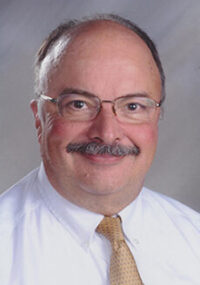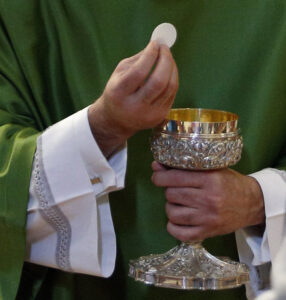Eucharist as divine food for our journey of transformation to eternal happiness

Living the Word / By Tim Irwin
Solemnity of the Most Holy Body and Blood of Christ (Corpus Christi)/June 6
Exodus 24:3-8; Psalm 116:12-13,15-16,17-18; Hebrews 9:11-15; (Sequence) Lauda Sion; Mark 14:12-16,22-26
Christians universally recognize the promise of eternal happiness in the celebrations of Christmas and Easter. This Sunday we celebrate the Feast of Corpus Christi — the Body and Blood of Christ present under the appearance of bread and wine. Unlike Christmas and Easter, this is a feast day few Christian groups acknowledge. Martin Luther described it as a form of idolatry.
The Church proclaims the Eucharist as the source and summit of the Holy Faith. The wisdom of this proclamation might seem self-evident to anybody who remembers that well-known axiom of high school health class — you are what you eat. The Eucharist is the Church’s most tangible invitation to become our better more Christ-like selves in this life and our best most Christ-like selves in eternity.
To accept this invitation of transformation to eternal happiness, we are asked to love the Father as Jesus does with our whole heart, mind, soul, and self, and others as Jesus loves them. We are called to be committed to the good of others for their sake and not for how we might benefit from our good intentions or actions.
Sincerely answering this invitation to become our better more Christ-like self occurs in the context of the lifelong faith-filled Christian journey. Eucharist is the divine food for that journey and the Holy Mass is the meal where the divine food is consecrated and served.
WILLING PARTICIPATION
The connection between the Holy Mass and a lifelong journey of transformation to eternal happiness may seem like a non-sequitur in this secular age. If it doesn’t make sense to you, many explanations of the Holy Mass available online might well clarify. Understanding how all of the parts work together can certainly be helpful, but the key is to simply realize that the Holy Mass celebrates the Paschal Mystery of Christ — his life, death and resurrection, not just as an historic event, but as our continuing journey — our journey of transformation to eternal happiness.
Wanting to embark on the journey of transformation is the prerequisite to having the fulfilling spiritual experience offered as we pray the Holy Mass. If I don’t want to hear the fat lady sing, then the opera’s potential may be lost on me. If I don’t want to become my better more Christ-like self, then the potential of the grace offered in the Holy Mass may be lost on me.
If we read and listen attentively to the Holy Gospel, we can’t miss the message. In Luke, Jesus says, “If anyone wants to come after Me, he must deny himself, take up his cross daily, and follow Me.” In this Sunday’s Gospel, Jesus institutionalizes the Holy Eucharist on the eve of his sacrifice on the cross. In John’s Gospel, Jesus clearly states the nature of the Holy Eucharist when he says, “Whoever eats my flesh and drinks my blood has eternal life, and I will raise him on the last day. For my flesh is true food, and my blood is true drink. Whoever eats my flesh and drinks my blood remains in me and I in him.” Some who heard Jesus found this teaching difficult to accept; I guess Martin Luther wasn’t the first.
The implication seems clear — a regular diet of Eucharist is the wise choice for anybody pursuing eternal happiness. This Sunday let us celebrate the divine food for our journey of transformation into eternal happiness with a renewed sense of commitment to becoming our better more Christ-like self today and our best most Christ-like self in eternity. Through our reception of the Body and Blood of Christ, the source and summit of the Catholic faith, may we be nourished in our journey of transformation to eternal happiness.
—
Tim Irwin teaches theology and philosophy at Notre Dame High School in Peoria. He is a member of Blessed Sacrament Parish in Morton.






